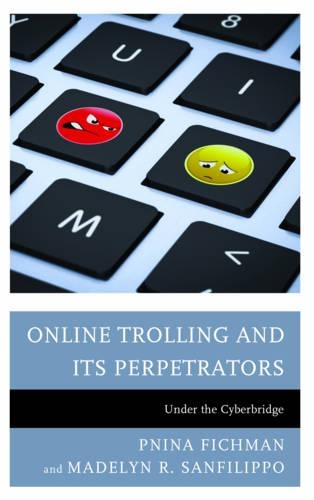
Online Trolling and Its Perpetrators: Under the Cyberbridge
(Hardback)
Publishing Details
Online Trolling and Its Perpetrators: Under the Cyberbridge
By (Author) Pnina Fichman
By (author) Madelyn R. Sanfilippo
Bloomsbury Publishing PLC
Rowman & Littlefield Publishers
11th April 2016
United States
Classifications
Tertiary Education
Non Fiction
Media studies: internet, digital media and society
Social, group or collective psychology
Digital and information technologies: social and ethical aspects
302
Physical Properties
Hardback
216
Width 160mm, Height 237mm, Spine 21mm
490g
Description
Online trolling and other deviant behaviors have always affected online communities. As online trolling becomes widely spread, myriad questions are raised, including: Who is a troll and why do trolls troll What are the enabling factors of online trolling How do members and administrators of online communities detect, interpret, and react to trolling How can online trolling be handled effectively What is the impact of the socio-cultural and technological environments on online trolling What motivates trolling The book answers these questions and includes the following focuses: Hard-core trolls and light trolls Gender, trolling, and anti-social behavior online Perception of trolling Collaborative trolling Ideological trolls Trolling around the globe
Reviews
Trolling is an online interaction that is meant to insult or offend, and is primarily intended to provoke others. In mass media journalism, trolling is purely presented as a social deviance, and specifically as evidence that online interaction has the potential to cultivate the worst in individuals. Online trolls have provoked suicides and even harassed the suffering families after a suicide. Fichman and Sanfilippo provide a nuanced analysis of how trolls and their activities are understood by young adultsemphasizing that trolling is an intentional behavior. Superficially, similar provocations can be experienced as humorous in a social context, but offensive and misleading in an educational context. Trolling can be abusive and distracting, but it can also pointedly challenge social norms and incumbent power. By provocatively twisting the truth, trolling evokes critical thinking. A skilled troll can steer narrowly between humor and offense, so that one cannot be certain that the interaction truly is trolling. The authors thorough analysis of trolling and their emphasis on literature review and empirical studies are strengths. . . .Summing Up: Recommended. Upper-division undergraduates and graduates students, especially those in the social and information sciences. * CHOICE *
[T]he authors offer nuanced explanations of the behaviors and motivations associated with trolling, provide numerous case studies to illuminate the practices many facets, and present the results of their thoughtful ethnographic research. . . .This text proves to be an excellent resource and a solid contribution to studies of social informatics and online communities through its ethnographic research, with near-exhaustive citation of past scholarship. . . .[The book] offers clear evidence to delineate between trolling and more serious forms of online deviance. * International Journal of Communication *
Author Bio
Pnina Fichman is the Director of the Rob Kling Center of Social Informatics, associate professor and the chairperson of the Department of Information and Library Science at Indiana University, Bloomington. Her research in social informatics focuses the relationships between information technologies and cultural diversity, online communities and global virtual groups, as well as online deviant behaviors, such as trolling and discrimination. In addition to her five co-edited/authored books, her publications appeared in journals, such as Information and Management, Journal of the American Society for Information Science & Technology, and Journal of Information Science. She earned her Ph.D. from School of Information and Library Science, University of North Carolina, Chapel Hill in 2003. Madelyn R. Sanfilippo is a doctoral candidate in Information Science at Indiana University, Bloomington's School of Informatics and Computing. Madelyn is interested in the relationships politics and information. Her work specifically addresses social and political issues surrounding information and information technology access; she considers the interaction between information policy and information technology as impacts information access, from a social informatics perspective, in her dissertation.
